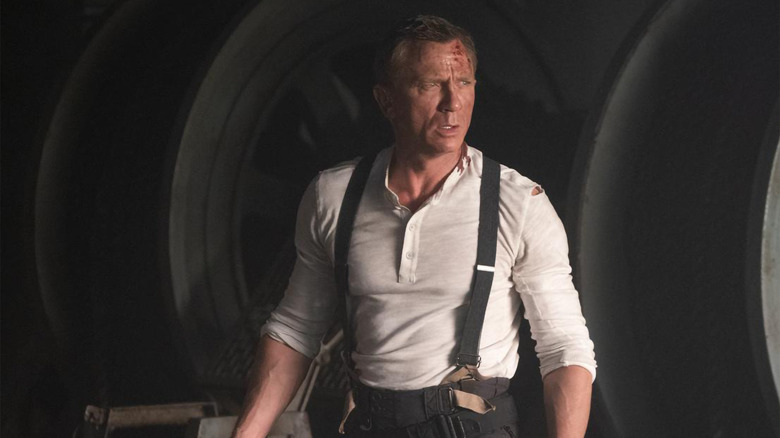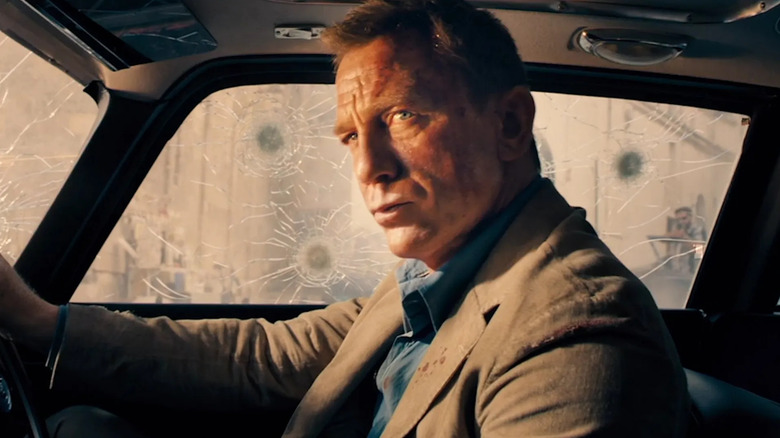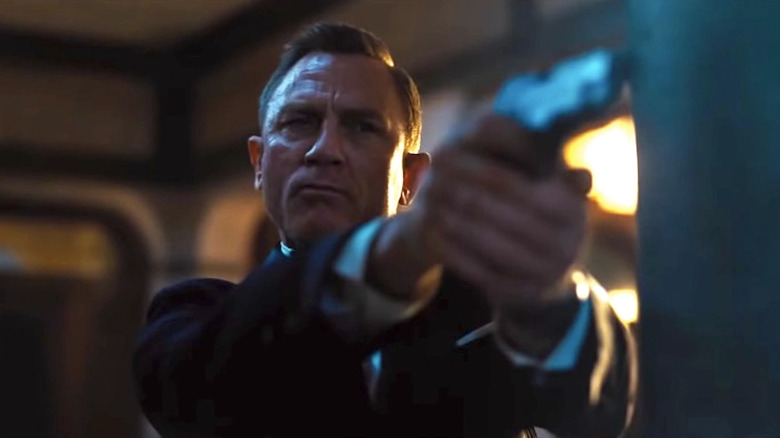Pierce Brosnan Has Mixed Feelings About Daniel Craig's Exit In No Time To Die
Warning: This post will contain spoilers for the 2021 film "No Time to Die."
Ian Fleming's first James Bond novel, "Casino Royale," was published in 1953, and the character first appeared on television the following year in an episode of the anthology action series "Climax!" The first James Bond feature film, "Dr. No" was released in 1962 and kicked off a long-running series of successful spy movies that codified a genre. James Bond stories typically had very simple premises, and the character's very basic sex appeal was already being satirized as early as 1967 with the release of a spoof version of "Casino Royale." Undeterred by parody, Bond movies continued apace for decades — and through multiple actors — arriving in 2021 with Cary Joji Fukunaga's "No Time to Die," the 28th appearance of the character in film and television. One might say that after 69 years, Bond has had quite enough time to die, thank you.
Which is what he infamously does at the conclusion of Fukunaga's film. Thanks to an injection of DNA-designed nanobots, James Bond (Daniel Craig) is unable to touch his girlfriend (Léa Seydoux) and child without killing them. At the same time, he's stranded on an island that is set to be destroyed by missiles. Rather than commit one of his trademark daring escapes, he merely bids his loved ones farewell and lets the missiles take him, a heroic end to a famous hero. James Bond Will Not Be Back.
'But ...'
Some may have been deeply moved by Bond's death, while others might have found it to be a violation of a certain rule. After so many reboots and such frequent recasting, one might get the impression that James Bond is immortal. One person who appeared to feel ambivalent about Bond's death was Daniel Craig's immediate predecessor, Pierce Brosnan.
In a recent interview with GQ, Brosnan shared his thoughts about where James Bond has gone since he stopped playing the role in 2002. Perhaps out of politeness, Brosnan never quite finished his thoughts on the matter and claimed to like one of the recent James Bond movies. He appeared, however, to feel merely warm on "No Time to Die" and also seemed unimpressed with the idea that James Bond will be recast yet again. He said dryly:
"It'll be interesting to see who they get, who the man shall be. Whoever he be, I wish him well. I saw the last one, and I saw 'Skyfall.' I love 'Skyfall.' I'm not too sure about the last one ... Daniel always gives of his heart. Very courageous, very strong. But ..."
Sadly, Brosnan did not elucidate on his disappointment. He could be upset that Bond died rather than being allowed to retire in peace. He could be upset that Bond died at all. Or he could merely be miffed at some of the film's creative choices.
This author has long held that Martin Campbell's 1995 film "GoldenEye" — the first to star Brosnan — is among the best James Bond movies. Bond was, after all, created during the Cold War. His particular brand of machismo was an effort to sexualize British spy work and make it seem enticing and effective to a British reader.
How useful is James Bond?
The appeal of James Bond was not just that he was capable, confident, charming, violent, and hypersexual — although those are the most appealing things about him — but that he represented a system that worked. There were Bad Guys in the world, and James Bond was there to stop them. British skill and intuition at its finest. The character was, on one level, always propaganda.
1995's "GoldenEye," the first James Bond movie made after the fall of the Berlin Wall, brought the nature of the character into question: How needed is a character like James Bond, now that the machine that built him has rusted and fallen apart? "GoldenEye" is about cleaning up the mess left behind after the end of the Cold War. It points out that James Bond left a trail of resentment in his wake. Even in the mid-'90s, it felt like the character was ready to be put aside.
Brosnan played 007 in three more films, however, and Bond was resurrected once more in 2006 with Craig and with a new "Casino Royale." This was a post-9/11 Bond — a tough, brutal, humorless version of the character that represented the world's rage during the George W. Bush administration. He offered a new catharsis for a new crisis. Bad guys can be stopped and crises can be averted. It's no wonder certain critics feel "Casino Royale" is the best James Bond movie.
By 2021, enough time had passed that the world no longer needed him. Killing Bond was not so much emotional as it was appropriate.
As the franchise will unlikely end, Bond will be rebooted again, this time into a post-Trump world. Whether or not he will continue to offer political catharsis remains to be seen.


